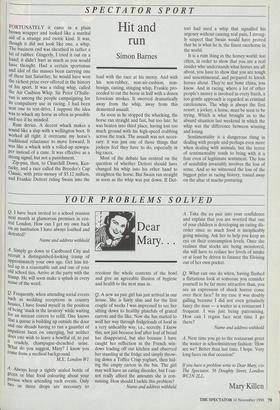SPECTATOR SPORT
Hit and run
Simon Barnes
FORTUNATELY it came in a plain brown wrapper and looked like a marital aid of a strange and exotic kind. It was, though it did not look like one, a whip. The business end was sheathed in rather a lot of rubber. Gingerly, I tried it out on a hand; it didn't hurt as much as you would have thought. Had a certain sportsman and idol of the masses been carrying one of these last Saturday, he would have won the richest prize ever offered in the history of his sport. It was a riding whip, called the Air Cushion Whip. Sir Peter O'Sulle- van is among the people campaigning for its compulsory use in racing. I had been sent one to test-drive. I suppose the idea was to whack my horse as often as possible and see if he minded.
Rum device. A decent whack makes a sound like a slap with a wellington boot. It worked all right: it overcame my horse's traditional reluctance to move forward. It was like a whack with a rolled-up newspa- per instead of a cane. It was effective as a strong signal, but not a punishment.
Zip-pan, then, to Churchill Down, Ken- tucky, and a race called the Breeder's Cup Classic, with prize-money of $5.12 million, and Frankie Dettori riding Swain into the lead with the race at his mercy. And with his non-rubber, non-air-cushion, non- benign, caning, stinging whip, Frankie pro- ceeded to cut the horse in half with a dozen ferocious strokes. It swerved dramatically away from the whip, away from this demented assault.
As soon as he stopped the whacking, the horse ran straight and fast, but too late: he was beaten into third place, having lost too much ground with his high-speed crabbing across the track. The assault was not neces- sary: it was just one of those things that jockeys feel they have to do, especially in big races.
Most of the debate has centred on the question of whether Dettori should have changed his whip into his other hand to straighten the horse. But Swain ran straight as soon as the whip was put down. If Det- tori had used a whip that signalled his urgency without causing real pain, I strong- ly suspect that Swain would have proved that he is what he is, the finest racehorse in the world.
It is a rum thing in the horsey world: too often, in order to show that you are a real insider who understands what horses are all about, you have to show that you are tough and unsentimental, and prepared to knock horses about. They're not bone china, you know. And in racing, where a lot of other people's money is involved in every finish, a too gentle approach is regarded as criminal carelessness. The whip is always the first resort: a jockey, a horse, must be seen to be trying. Which is what brought us to the absurd situation last weekend in which the whip was the difference between winning and losing.
Sentimentality is a dangerous thing in dealing with people and perhaps even more when dealing with animals, but the terror of sentimentality tends to bring with it a fear even of legitimate sentiment. The loss of sensibility invariably involves the loss of sense. And so we witnessed the loss of the biggest prize in racing history, tossed away on the altar of macho posturing.


















































































 Previous page
Previous page